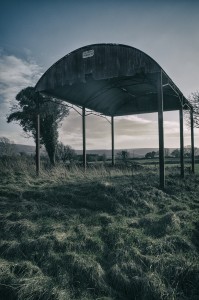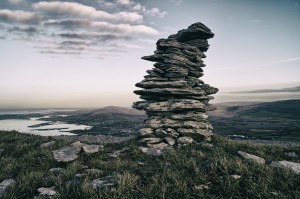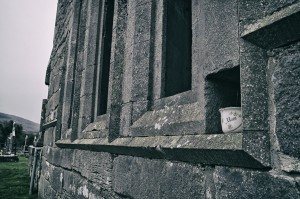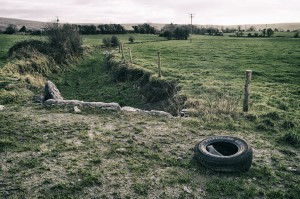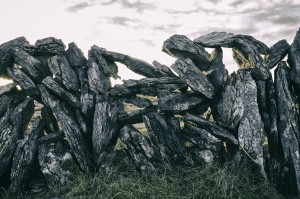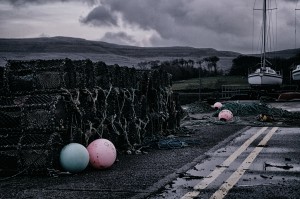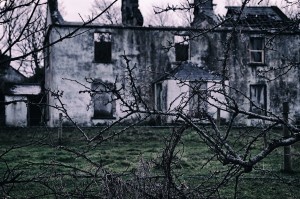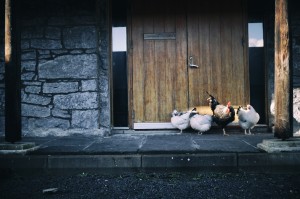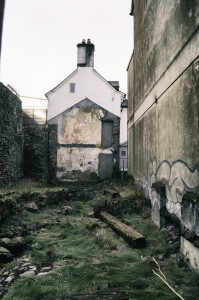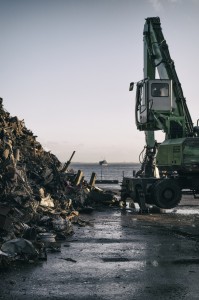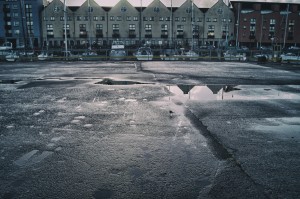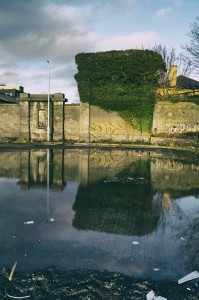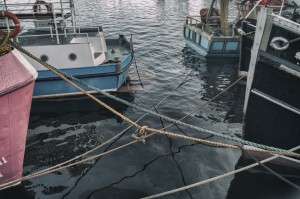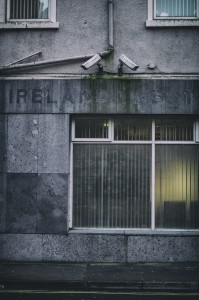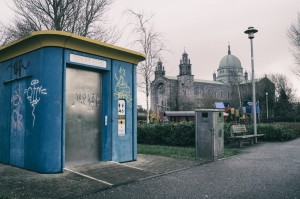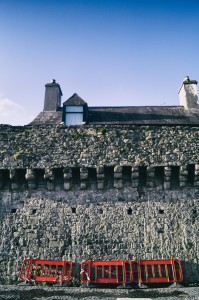A raised circle of ground stood against the level grazing field. I stood at the base of the green slope, my feet almost touching it, but just an inch back. Nothing moved around me: it was silent. I closed my eyes and listened. The silence became even stronger. These “fairy forts” seemed to demand respect from even the wildlife.
I considered turning back, but I found I couldn’t bring myself to turn around. I took a deep breath and started climbing up the slope. The simple activity of entering the fort felt strangely exhilarating. It reminded me of first setting foot in Ireland.
It had been liberating stepping off the plane. I was free of the crying children and free to stretch my legs. But more than that, I was standing on ground more than an ocean apart from my front door. Around me the pavement was wet from recent rain. I breathed in deeply and felt the balmy air fill my lungs, replacing the dry air of home.
After clearing customs and picking up my checked baggage, I walked towards the exit in long steps. I quickly spotted a familiar pair of brown eyes set under a head of buzzed blond hair. I felt my face sprout a huge grin. His face followed suit, exposing his slightly crooked but piano-key-white teeth. His hand shot up in a wave, blurry from the speed. I picked up my pace and overtook him in a wide hug. He wobbled a little.
“James! I’m so happy to see you!” Ian said loudly once I pulled away from the hug. His voice sounded a little different from when I’d last seen him over the summer. It had a faint hint of an Irish brogue.
“Me too! How were the first few days of the semester?”
“They’re good. Come. I got a taxi waiting.” He grabbed my rolling suitcase from me and took off at a clipping pace. I had to jog a bit to catch up. We reached a line of taxis outside, and Ian pointed to a taxi with a tall slim man leaning against its side. He wore a navy jacket and a black newsboy cap. Ash from his cigarette lingered in the creases along the front of his chest. When he saw Ian approaching, he put out the cigarette. We reached him, and he grabbed my suitcase from Ian.
Ian struck up a conversation with the man as he loaded my suitcase into the truck. I stood on the sidewalk with my hands deep in my jacket’s pockets. The driver turned to me expectantly.
“Your backpack,” Ian helped me out.
“Oh, yeah. Sorry.” I forced out as I handed the man my backpack.
“Oh, so you’re an American too, eh?” the driver asked upon hearing my accent.
“Yeah,” I responded. There was a silence as I struggled to think of some way to continue the conversation. Coming up empty, I motioned towards the taxi and proceeded to climb in. Ian climbed in after me. The driver secured the trunk and got in the driver’s seat. We pulled out of the airport and got on the highway to Galway.
Ian continued his conversation with the driver while I stared out the window at the passing scenery. After a while, their conversation died out, and we drove in silence. Without any noise keeping me awake, the jetlag hit me full force, and I was quickly unconscious.
I woke up to the warmth of breath on my ear and Ian whispering, “You should ask the driver about local fairy stories.”
“What?!” I asked sleepily—and a little too loudly judging by Ian’s grimace. There was silence. I looked at the driver nervously, but he was focused on the road. By this point I was fully awake. After a short moment, I felt Ian’s hot breath on my ear again.
“Just do it.” I jerked my head back to look at him. His eyes were unblinking, and his mouth was set in a determined grin. I recognized this look. It meant I wouldn’t be getting off the hook until I complied: he was determined for me to embarrass myself. Still I hesitated, and Ian decided to force my compliance. “So my friend here is really interested in fairies…” He addressed the driver, trailing off to signal that it was my turn to takeover. There was silence as the driver looked at me through the rearview mirror.
“Umm… yeah. What are the local stories?” I cursed myself for being so predictably pliant.
“Oh, a fairy lover are ya?” I felt my cheeks grow hot and Ian let out a short laugh. “Well I’ve a few things I can tell.” He then launched into a lengthy story that occupied the rest of the drive.
Standing in the depressed center of the earthen ring, I thought back to what our driver had told us about ring forts: superstition holds that one should walk clockwise around the edges to avoid agitating the fairies. The snap of a twig crushed under an animal’s foot whispered from the grove of hazel in the distance and broke me out of my daydreaming. A powerful defiance swept through my body, and I was suddenly overbrimming with nervous energy. I felt it bouncing around inside me like a tennis ball, and each bounce reverberated like a meteoric impact. Without any further meditation, I started walking around the ring in a counter-clockwise path. My pulse quickened in excitement, and I started to hear my heartbeat thrumming in my ear.
After I had settled into the spare bedroom in Ian’s apartment, and he had shown me around the area, we quickly fell into a routine. I would wake up when he was getting ready for classes. After he left, I’d take a shower and leave the building to go for a walk around the city. I usually stuck to the river area. Ian had showed me around the university the second day of my stay, and I had been surprised that most of the buildings were modern installations. It turns out the main building everyone visits is more suited for postcards than classes. While he was showing me around, I spent my time trying to find something betraying age or foreignness. All I came up with were strange runoff stalactites hanging off the stair behind the cafeteria. Once I knew that the university wasn’t all I’d imagined, I developed distaste for the area. I started avoiding it on my walks. I’d take a late lunch at one of the many restaurants near the square. When it was late enough I’d meet Ian after classes and go out to the pub.
Through my repeated long walks, I quickly realized that Galway was a very small city. In little more than a week, I felt that I had exhausted all the possible sights to see. I started to stay in more, reading one of the many comic books off Ian’s shelf or making another attempt at my writing.
Ian and I continued to go to the pub, but our conversations slowed to silence. Around us were the lapping waves of laughter and conversation. Glass clinked on tables, and music pumped through the speakers in thick pulses. Amidst that, we were an oasis in the sound. I would nurse my pint of Guinness, and he would play with his phone. I slowly realized that this set him apart from the rest of the bar patrons. I ducked my head and slumped my shoulders. I didn’t want to be seen with someone who checked his phone like that.
I sighed deeply, hoping to get his attention. Ian either didn’t hear, or he was pretending he hadn’t. The silence that followed was overwhelming, and I dropped my eyes to the table. My finger traced the lip of my empty pint in slow circles and I briefly considered getting another.
After completing two full revolutions around the fairy fort, my pace began to slow. My pulse decreased and my ears cleared of my heartbeat. I stopped and listened. It was just as silent as before. I sighed and lowered myself to the ground. With my back against the prickly grass, I stared up into the sky. My eyelids felt very heavy, so I closed them. As I drifted free of consciousness, I hoped to feel a tap on my forehead, or hear a voice addressing me. Nothing came. So I slept and dreamed of whispered conspiracies and retributions.
* * * * * * * * * * * * * * *
Posters of large faces lined the airport walkway on the way to customs. The faces filled the entire poster and stared directly out. At the bottom, each said “The Many Faces of Ireland”.
After walking down the hallway for a couple of minutes, one poster caused me to pause briefly. The man inside was almost completely indistinct. He had dark hair and eyes and a clean-shaven face. He looked barely thirty. However, he was smiling, and it was this that caught my eye. Every other face before him looked slightly miserable.
The action of the airport pulled me away and I forgot that image for a time. But during my time in Ireland, I would meet many people, and they would conjure up this memory again.
Our bus driver Brian met us outside the airport and brought us to the vehicle. Periodically during our drive to Ballyvaughan, Brian would say something over the tour bus’s microphone in his gentle brogue. To our left would be the remnants of English occupation, or something reminded him of and Irish connection to Hollywood, or he would point out something geographically distinct to the area. Over the next few weeks, I would come to recognize this as his distinctive style of storytelling.
During one of our tours with him, he pulled the bus over on the side of the road next to two stone monuments. “This monument is for those who died in the potato famine,” he said. He described how the English would not give the poor peasants any food, despite making a profit during the years of the famine. He told how a little boy was starving near a storehouse, and an English official wrote a letter to the governor that someone should take care of “it”. He pointed up the hill on the opposite side, and said there were mass graves at the overcrowded workhouses because so many people died from disease. He added that people still avoid the sites of these graves.
We all sat silently as he added more and more tragedy onto the story. The injustices and oppression doubled and redoubled. Yet his voice remained soft and neutral. His stance remained relaxed and teacherly. When he was finished, he turned around, pulled the bus back onto the road, and continued the tour. In another twenty minutes, he pulled the bus over again, and told the Irish legend of a redheaded warmaiden in the same tone and style.
One day as David and I climbed the hill nearing the college, we came upon a vast flock of crows on both sides of the wall-lined road. The forms of their little black bodies broke up the green like swaths of freckles on skin. There must have been at least fifty of them pecking at the ground and lifting their heads to caw. Cars could be heard zooming along the road behind us every few minutes or so, interrupting the incessant squawking that consumed the area in a fog of sound. The crunching of our footsteps feebly punctuated the noise in a steady rhythm. I laughed out loud for no reason except to hear my own voice amidst the cawing. I immediately wished I hadn’t. Beside the overwhelming din of the crows, our steps and our voices seemed alien: we were trespassers on this road.
I found myself imagining what this scene must have been like in the distant past, in the time of pagan beliefs and unspoiled wilderness. In the absence of roads, wall-bordered fields stretched on until they bended over the hills and disappeared. And crows held domain of the ungrazed fields. They covered the land and looked as numerous as black stars in a green sky.
Around us, it started to rain. Of course it would, I thought. I turned to David and commented that this was the most ominous thing I had experienced in my life. He let out a short laugh, and we both fell silent again. As we continued drudging up the hill, the castle tower loomed ahead of us. It looked strangely similar to a church from our vantage. I realized how strange it was that buildings of war and worship could look so similar.
When we had been in Galway, David and I had spent part of an afternoon wandering the grounds of the Church of St. Nicholas. David was ducking and twisting among the weathered graves as he took pictures. I stood apart from him and copied down some of the epitaphs in my pocket notebook. “Here lie the remains of so-and-so”, or “Sacred to the memory of such-and-such”. Some of them were so weathered that the graves were practically smooth. I puzzled over some of these but was unable to figure out what they said.
I stood over one such grave, my pencil unmoving in my hand, when David called me over. “Hey Stephen, come check this out.” I made my way lazily over to him, and he pointed to something on the ground. I looked where he was pointing, but I failed to see what he found so interesting. All I saw was the worn, stone-paved path. Small patches of green poked playfully between cracks, but he wouldn’t have called me over to look at them.
I looked back at him questioningly. Seeing my confusion, he pointed back to the retaining wall and said, “It’s made of headstones.” I inspected again where he was pointing, and saw worn letters in a now-familiar format. Among the stones making up the retaining wall between the church and the graveyard was a sideways-lying headstone. I looked around and saw more examples. In the stone walkway, some of the stones had text, and there was one headstone that was a part of the church’s foundation.
After another ten minutes, we left the church. As we walked out of the grounds, the crunching of gravel grabbed my ears and made me look down. The gravel of the driveway was the same color as the headstones. What if the gravel is made of ground up headstones too, I asked David. I meant it as a joke, but I felt that there was some sense of truth to it.
Ireland is a place where the ancient is nearly unavoidable in everyday life. And the span of deaths is impossible to ignore. Neighbors greet each over mossy walls built hundreds of years ago by a man long dead. Crumbling ruins dot the landscape. A farmer may have the ruins of another farmer’s stone barn on his land long after he went bankrupt and had to move on. And students go to classes with a castle nearby, built to defend from bloody attacks. The walls have slits for arrows, and the damp stairs have holes to pour hot wax. And thus I found it plausible to imagine that these people would grind up old headstones to build a needed gravel driveway for their church. And afterwards, they would go to the pub and drink in the shadow of the head of a decapitated king.
